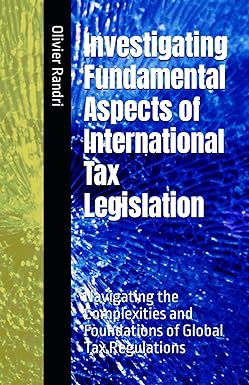Go back


Investigating Fundamental Aspects Of International Tax Legislation Navigating The Complexities And Foundations Of Global Tax Regulations(1st Edition)
Authors:
Olivier Randri

Cover Type:Hardcover
Condition:Used
In Stock
Include with your book
Free shipping: April 04, 2024Popular items with books
Access to 3 Million+ solutions
Free ✝
Ask 10 Questions from expert
200,000+ Expert answers
✝ 7 days-trial
Total Price:
$0
List Price: $70.00
Savings: $70(100%)
Book details
ISBN: 979-8867867980
Book publisher: Independently published (November 16, 2023)
Get your hands on the best-selling book Investigating Fundamental Aspects Of International Tax Legislation Navigating The Complexities And Foundations Of Global Tax Regulations 1st Edition for free. Feed your curiosity and let your imagination soar with the best stories coming out to you without hefty price tags. Browse SolutionInn to discover a treasure trove of fiction and non-fiction books where every page leads the reader to an undiscovered world. Start your literary adventure right away and also enjoy free shipping of these complimentary books to your door.
Investigating Fundamental Aspects Of International Tax Legislation Navigating The Complexities And Foundations Of Global Tax Regulations 1st Edition Summary: The introduction of international tax legislation serves as the bedrock for governing the intricate landscape of cross-border financial transactions. In an era characterized by globalization and increased interconnectedness, the need for a comprehensive legal framework to regulate taxation across jurisdictions has become paramount. This chapter will delve into the historical context, evolution, and significance of international tax laws, shedding light on their multifaceted role in shaping global economic relations. Key principles such as sovereignty, equity, and cooperation will be explored within the context of seminal articles and legal doctrines, emphasizing the foundational concepts that underpin the complex fabric of international taxation. As we embark on this exploration, it is essential to consider the ever-evolving nature of international tax laws, reflecting the dynamic challenges posed by the digital economy, jurisdictional conflicts, and the ongoing efforts to harmonize global tax compliance. Through an analysis of relevant legislation, including but not limited to articles from the OECD Model Tax Convention and landmark court decisions, this chapter seeks to provide a comprehensive understanding of the nuanced world of international tax legislation.The historical evolution of international tax law is a fascinating narrative that unfolds through centuries of global economic interactions. The roots of this legal framework can be traced back to ancient civilizations where rudimentary forms of taxation existed to fund the functions of early empires. However, the modern conceptualization of international tax law began to take shape during the 20th century.In the aftermath of World War I, the League of Nations recognized the need for international cooperation on fiscal matters. The League's efforts laid the groundwork for subsequent developments in international tax law. Notably, the League's Committee of Experts on Double Taxation worked towards establishing principles to prevent the burdensome taxation of income in multiple jurisdictions.The real breakthrough came after World War II with the establishment of the United Nations (UN). The UN, through its various organs and agencies, became a focal point for discussions on the fair allocation of taxing rights among nations. During this period, the Organization for Economic Cooperation and Development (OECD) emerged as a key player in shaping international tax norms. The OECD's Model Tax Convention on Income and Capital, first introduced in 1963, has served as a blueprint for countless bilateral tax treaties.Specific articles within these model conventions have had a profound impact on international tax law. For instance, Article 5 addressing the concept of permanent establishments became a cornerstone in determining where a business is taxable. Additionally, the model's guidance on profit attribution and the resolution of double taxation disputes set standards followed by nations worldwide.
Customers also bought these books
Frequently Bought Together
Top Reviews for Books
Johnny Ortiz
( 5 )
"Delivery was considerably fast, and the book I received was in a good condition."










